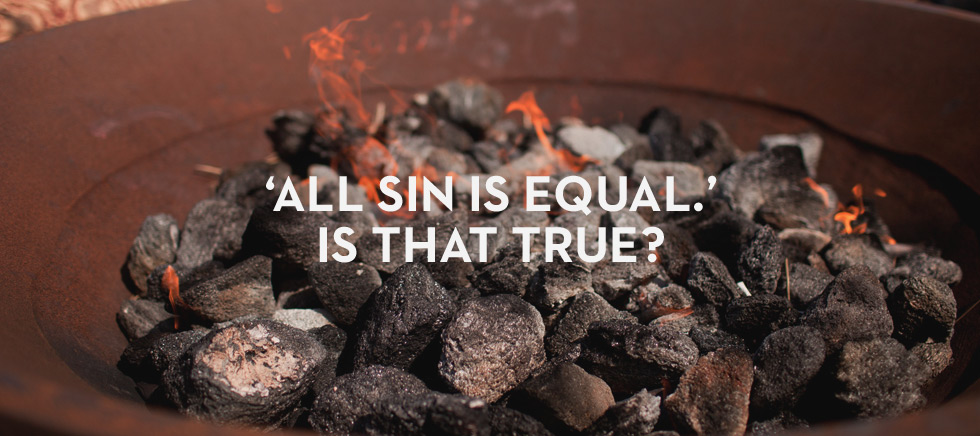When we believe that all sins are equal, it often causes us to not take the problem of sin seriously.
Have you heard this said? Maybe you’ve said it yourself—it’s a common refrain among people, Christians and non-Christians alike.
But is it true?
Why do people say this?
People may use the statement for one of the following motivations:
- They don’t want to be like the Pharisee in Luke 18.
- They want to find common ground with non-Christians.
- They don’t want to be labeled “legalistic” or “judgmental” by others.
These motivations are understandable, but the question still remains whether all sins are equal before God.
Deadly sin, deadlier sin
Sin is the great equalizer. Whether a beggar on the streets or a king in a palace, every single person is—apart from Christ—a sinner both by nature and by choice (Rom. 3:23). Sometimes the sin is obvious and we know what it is, and other times, the wool is totally over our eyes and we have no idea.
All sin is deadly, but there are many passages in the Bible where different types of sin are spoken of as being particularly grievous:
- Numbers 15. This chapter differentiates between sins that are unintentional and sins “of the high hand,” meaning sins that are intentional and rebellious. (Think: middle finger to the sky.)
- Deuteronomy 18:12, 27:15. In the Mosaic Law, certain sins are listed as being abominations, meaning these sins are an offense to God (e.g. sexual sin, improper worship, idolatry).
- Proverbs 6:16–19. Seven things are listed as sins that God hates (and they’re not the seven deadly sins as most people know them).
- Matthew 12:31, Mark 3:29. Blasphemy against the Spirit is said to be an unforgivable sin. (For a good treatment of this subject, listen to Acts 29 pastor Sam Storms’ sermon “So close, yet so very far away.”)
- Luke 20:47. Jesus says that the Pharisees will receive a “greater condemnation” for their sins of religious pride (yikes!).
- John 19:11. Jesus tells Pilate that Judas has committed the “greater sin.”
- 1 John 5:16–17. John differentiates between sin that leads to death and sin that does not lead to death.
In one particularly striking New Testament passage, Paul speaks of sexual sin as being different from all other sin because, “Every other sin a person commits is outside the body, but the sexually immoral person sins against his own body” (1 Cor. 6:18). Bible commentators are fuzzy on what the phrase “against his own body” means exactly, but it doesn’t take a Bible degree to see that Paul is urgently, passionately warning his hearers to avoid sexual sin at all costs.
Why does it matter?
All sin is deadly, but there are some types of sin that are so serious that they warrant an extra-impassioned warning, a sterner rebuke, a more drastic plan to avoid temptation. Additionally, some sins are worse than others in terms of their immediate effects. If someone steals a candy bar, sinful as that may be, it does not have the same effect as when someone molests a child.
I am convinced that use of the claim “all sin is equal in the eyes of God” is inaccurate and unhelpful. It is inaccurate because it does not line up with what the whole of the Bible teaches. It is unhelpful because it downplays just how serious the problem of sin really is. Sin, by its very nature, is never satisfied. It grows from bad to worse and leads to death (James 1:15). As the great English preacher John Owen put it: “Every rise of lust, if it has its way reaches the height of villainy; it is like the grave that is never satisfied. The deceitfulness of sin is seen in that it is modest in its first proposals but when it prevails it hardens mens’ hearts, and brings them to ruin.”
When we believe that all sins are equal, it often causes us to not take the problem of sin seriously. This attitude then leads us to not take seriously the biblical command to put our sin to death by the power of the Spirit.
The cross, the cross, the cross
The good news is that regardless of what sin we have committed, forgiveness is found at the cross of Jesus Christ. And when someone sins against us, we can find cleansing and redemption in Jesus. On the cross, Jesus took the beating that we all deserve for our sins. It might not be truthful to tell someone that all sins are equal in God’s sight, but it is very truthful to tell them that all sins can be forgiven because of Jesus’ death on the cross. We can confidently proclaim forgiveness for any type of sin because Jesus rose again on the third day to prove that he was God and that he was able and willing to forgive sinners. What an amazing Savior!
Are you in Christ? Then God has forgiven you for all of your sins—past, present, and future. Jesus Christ shouted from the cross as his final words in triumphant victory, “It is finished!” At that moment, sin was atoned for and sinners were forgiven.
–Pastor Mark
Who Do You Think You Are? p. 157.















